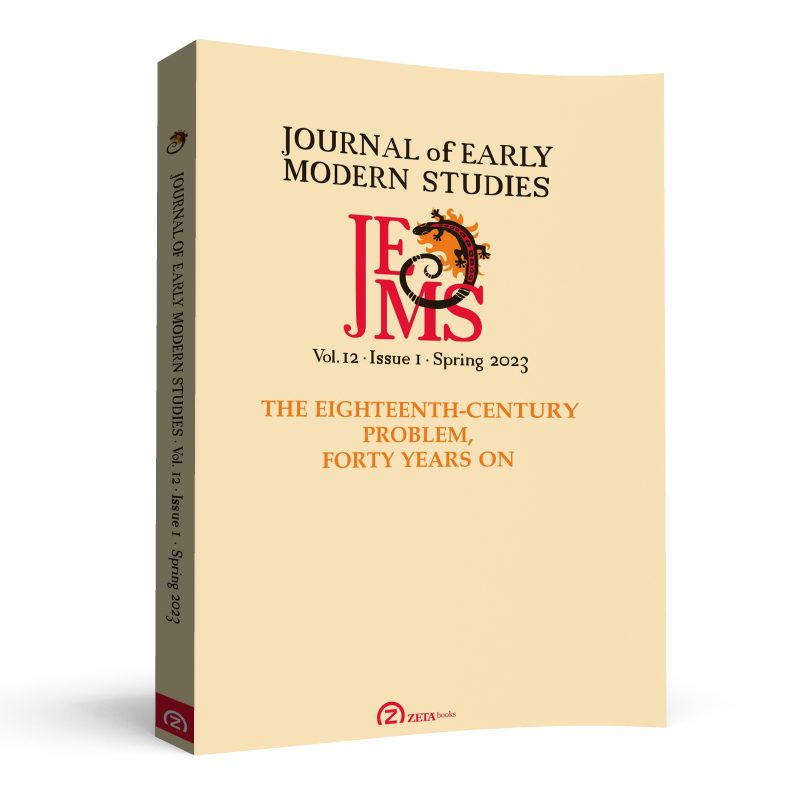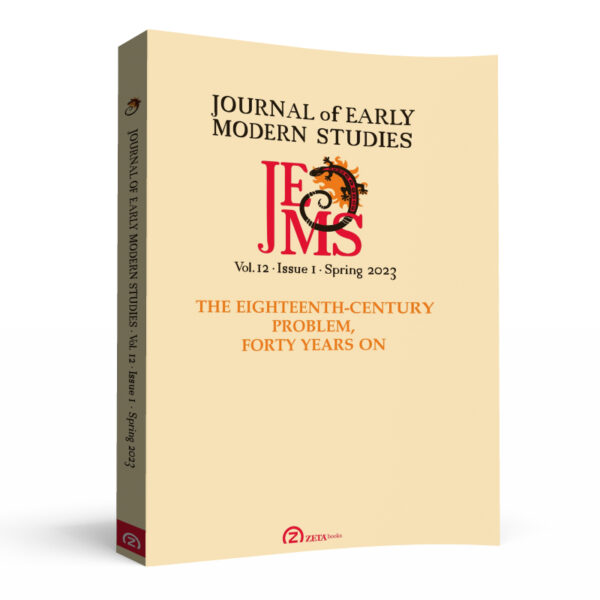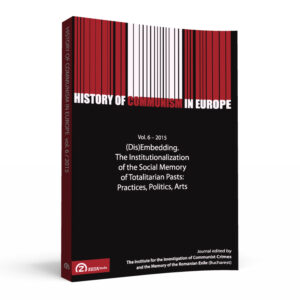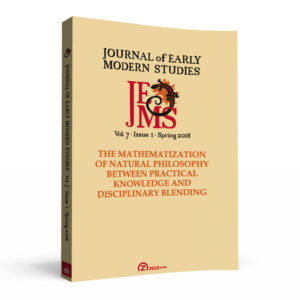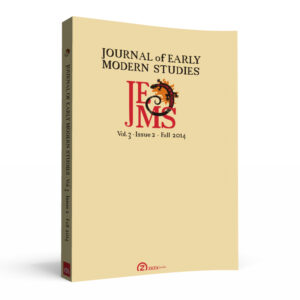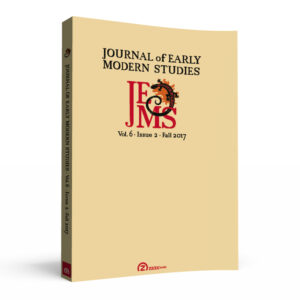Journal of Early Modern Studies, Volume 12, issue 1 (Spring 2023)
ISSN: 2285-6382 (paperback) / ISSN: 2286-0290 (electronic)
CONTENTS
Articles:
MICHAEL BYCROFT: Introduction: Science Beyond the Enlightenment
Abstract: The eighteenth century has long been a problem for historians of science. The century suffers from an apparent lack of towering individuals and unifying theories, as Geoffrey Cantor observed in an essay published in 1982. Much good work has been done in the forty years since then, most of it aimed at locating science in the Enlightenment. But the Enlightenment is just one of several themes that can help to make sense of eighteenth-century science as a whole. The other themes may be summarised as Classification, the First Scientific Revolution, the Second Scientific Revolution, Discipline Formation, and Natural Philosophy. The articles in this special issue are relevant to all six themes, as a summary of those articles will show. This essay ends with suggestions for future research on eighteenth-century science. The upshot is that we need to go beyond the Enlightenment by considering the five other themes discussed here and by considering events in general history other than the Enlightenment.
DOMENICO BERTOLONI MELI: Science and the Enlightenment Revisited
Abstract: At nearly forty, Science and the Enlightenment (Cambridge, 1985) by Thomas L. Hankins is seriously dated but still widely used, broadly reliable for what it covers and frustrating for its omissions, richly informative in its contents and somewhat opaque in its intellectual coordinates. For better or for worse, with its compact two hundred pages of text and remarkably well-chosen images, it remains the best textbook on the period, even though recent research has greatly enriched, problematized, and subverted older assumptions. This essay situates Hankins’s textbook within our changing understanding of the sciences in the Enlightenment, providing a critical evaluation of its achievements, problems, and intellectual agenda. I focus on periodization and the role Isaac Newton’s main works, Philosophiae naturalis principia mathematica (1687) and Opticks (1704)—both with much expanded later editions—play in Hankins’s narrative with respect to their intellectual and methodological agenda. While offering some thoughts on what mid-1980s readers may have reasonably expected from a textbook on the Enlightenment, I also include brief reflections on how the field has changed in recent times and some comments on what a new textbook may look like, forty years later.
BRENDAN DOOLEY: Natural Knowledge at the Threshold of the Enlightenment: The Case of Antonio Vallisneri
Abstract: Italian contributions to the Enlightenment are most often discussed in terms of the slow acceptance of Newtonian science (Ferrone) or the obstacles to change within a quaint museum of antiquated states (Venturi). This case study of an important naturalist attempts to identify the paths to change between tradition and revolt, in fields of natural knowledge that are sometimes less regarded in the context of an international movement of intellectual emancipation. In spite of an early attachment to some form of physico-theology, Antonio Vallisneri, professor of medicine at the University of Padua from 1700 to his death in 1730, made a number of innovative contributions to biological description and natural history which placed him among the forerunners of Georges Buffon. Heir to the empirical approach enshrined in the work of Marcello Malpighi, for the most part he attempted to avoid much of the philosophical and theological speculation raging between deists and atheists. However, the implications of his work, including activity as a science communicator to wider audiences, pointed to a reassessment of the importance of accurate natural knowledge in the ongoing reform of public instruction and cultural institutions then occurring in the major cities of Italy and abroad, an important plank in the Enlightenment program in the years leading up to the French Encyclopédie.
EMMA C. SPARY: Reenchanting the Enlightenment
Abstract: In light of research which, since the publication of Rousseau and Porter’s Ferment of Knowledge, has demonstrated the continued centrality of magic and the occult to what may be termed “scientific knowledge” in the early modern period, this essay argues that one domain of practice where these concerns remained paramount well into the eighteenth century is the consumption of recipes. Whether exchanged between individuals or collected in print format, these mobile informational media relied on forms of proof underpinned by personal experience and collective accreditation, with an inductive and empirical focus that was distinct from Cartesian deduction. Because the culture of recipe exchange was so widespread, encompassing scholars, savants and lay readers, secrets offered ways to challenge strict mechanistic interpretations in favour of a view of the natural world as informed by unseen active powers, particularly where the virtues of materials such as magnets or medicinal simples were concerned. Using private library catalogues of book owners, a commonplace book and a scientific periodical produced in France during the decades after 1700, the article traces the way secrets culture continued to foster an epistemological space in which mechanical explanations evidently fell short of accounting for quotidian experience.
ANITA GUERRINI: Power and Knowledge in Eighteenth-Century Collecting
Abstract: Both The Ferment of Knowledge and Geoffrey Cantor’s essay review defined the “eighteenth-century problem” in terms of the lack of a totalizing vision. Forty years on, the problem has shifted to the appropriation of eighteenth-century science by both the political left and the right. As historians grapple with the legacies of slavery and colonialism, an emerging theme is material culture and its “entanglements.” The subject of this essay, collections and collecting, is central to this new historiography. Collections included antiquities, natural history, anatomy, and ethnographic objects. My focus will be on human skeletal collections. Historians who have considered skeletal collections have focused mainly on the later eighteenth century and on developing concepts of race and geological time. But their significance is much broader. Collecting entailed entanglements both of cultures and of genres. Such collections could be medical, geological, aesthetic, taxonomic, or all or none of these. Case studies of collections of human bones, skeletons, and skulls reveal a different eighteenth century from that which the historians of 1980 envisaged, and bring questions of value and values to the centre of our reading of history.
RICHARD SORRENSON: Improving Instruments
Abstract: Historians have long been wary of teleological narratives of scientific change. But it is possible to tell a progressive narrative without being teleological, and that is precisely the kind of narrative that is needed to make sense of science in eighteenth-century Europe. Change in this period tended to be incremental rather than sudden, evolutionary rather than revolutionary. This may be illustrated by the scientific instruments of the period, which were usually improvements on existing instruments rather than entirely new instruments. Existing instruments were combined, their power augmented, and their accuracy increased, three routes to improvement that may be illustrated by the gazometer, the reflecting telescope, and the theodolite. The notion of improved instruments was a variant of a wider phenomenon in the eighteenth century, the use of “improvement” and similar notions to understand economic and political change.
ADRIAN WILSON: The Great Instauration of the Eighteenth Century [OPEN ACCESS]
Abstract: This paper argues that there took place in the eighteenth century a specific, distinctive and essential phase in the emergence of modern science, a phase which can be characterised as “the Great Instauration” in that it witnessed the large-scale realisation of Francis Bacon’s earlier vision—albeit not, for the most part, through the specific means which Bacon had proposed. That claim is exemplified in three fields—the “mathematico-physical sciences,” chemistry and electricity—each of which yielded dramatic and permanent advances in knowledge; and an attempt is then made to render those advances intelligible in terms of specific social and technical themes. The paper argues that the eighteenth-century Great Instauration arose from the development of an international natural-philosophical community, made possible by new institutions and especially by new publication media. And it suggests that what made this social development epistemologically fruitful was an inherently progressive process which had been anticipated by Bacon, namely what Sophie Weeks has called his “cybernetic” account of knowledge-making—the refinement of both questions and techniques in the light of Nature’s response to investigation.
Reviews
MATTEO FORNASIER
Fabrizio Baldassarri and Andreas Blank (eds.), Vegetative Powers. The Roots of Life in Ancient, Medieval and Early Modern Philosophy, Cham: Springer, 2021, ISBN 978-3-030-69708-2, xx + 459 pp.
SPERANȚA SOFIA MILANCOVICI
Marco Storni, Maupertuis. Le philosophe, l’académicien, le polémiste, Paris: Honoré Champion, 2022, ISBN 978-2-7453-5672-7, 305 pp.

